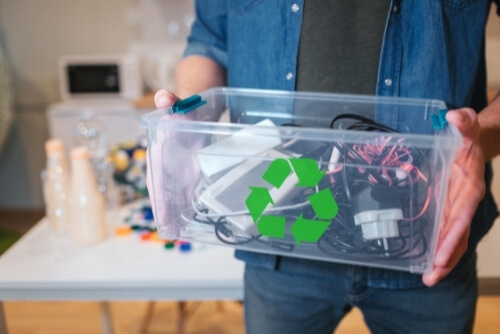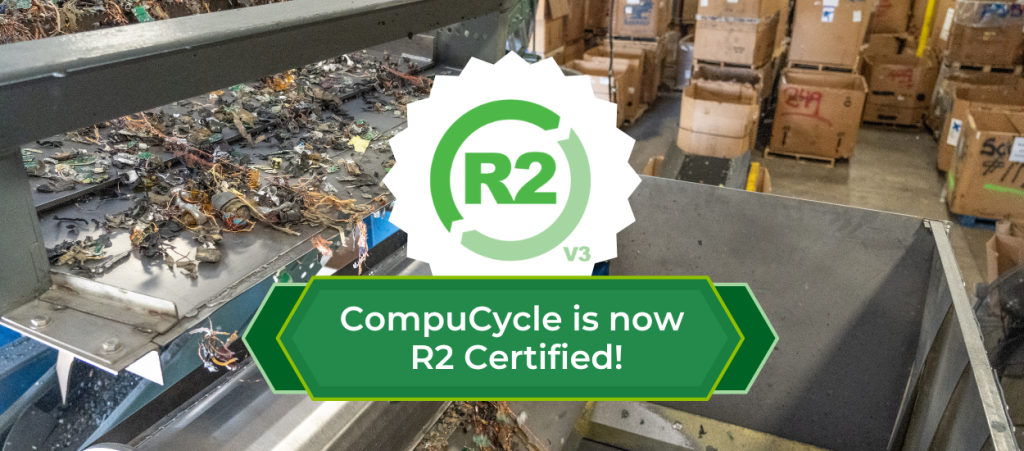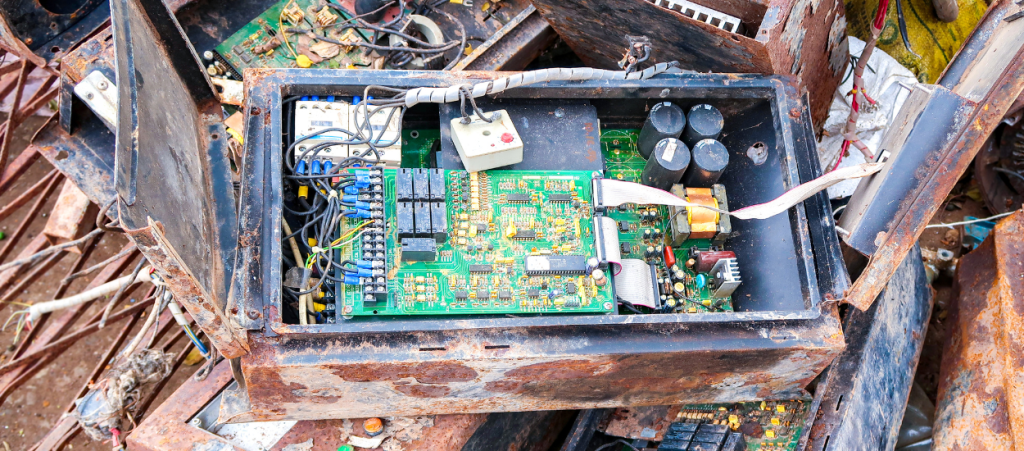
We live in a digital world. From the smartphones that we carry to the tablets that we use during the morning commute to the smartwatches that track our every movement, we not only live in a digital world, but we wear it, too. Unfortunately, the amount of electronic trash that is produced each year seems to grow exponentially. In 2016, there were 6.3 million metric tons of electronic garbage produced in the United States. With the growing number of U.S. smartphone users increasing to 237 million, it is projected that e-waste will also continue to increase. If you care about reducing the negative environmental, health, and financial impact of e-waste, then you will want to take the necessary steps to begin recycling e-waste. According to our research, #eWaste is becoming the world’s fastest-growing trash stream. A significant (but ultimately unquantified) portion of this e-waste is quietly exported, mostly to Asia. Via @nytimes https://t.co/hiRJHrCxKb — UN University (@UNUniversity) July 9, 2018

What Is Defined as E-Waste?
E-waste is the informal name given to those electronic products that are nearing the end of their “useful life” and about to be thrown into the trash. The most popular types of electronic products thrown out include computers, televisions, smartphones, tablets, copiers, fax machines, and speakers. It’s important to note that to minimize the environmental impact of e-waste, you should instead try to reuse, refurbish, or recycle your electronic products. Keep in mind that e-waste is not only harmful to the environment, with an EPA estimated 60 million metric tons entering landfills each year, but the waste also represents a lost economic opportunity. In fact, many of the product’s components can be sold or recycled to create new devices. The latter two actions can generate income, but they help reduce the negative environmental impact of e-waste that is not disposed of properly.
Did you know that recycling e-waste offers many advantages and benefits? The following 10 reasons can help you understand why you should make a diligent effort to dispose of your electronics properly.
1. E-Waste Contains High Levels of Precious Metals
Electronic waste contains precious metals estimated at a 40 to 50 times richer value than the ores that are mined from the Earth. Unfortunately, when electronics are thrown away, the majority of these precious metals are lost. For example, it is estimated that only 10 – 15 percent of the gold found in e-waste is recovered for reuse, recycling, or resale. Properly disposing and recycling e-waste can increase the percentage of precious metals that are successfully recovered from outdated electronics.
2. E-Waste Contains Toxic Substances
It’s no secret that e-waste contains toxic substances; however, far too many people think throwing away a small amount isn’t harmful to the environment. The truth is that many electronic devices contain chromium, cadmium, mercury, lead, and other heavy metals that can harm the environment in almost any sized quantity. The toxins emitted from improperly disposed e-waste can contaminate the water, soil, and air. Additionally, harmful toxins can cause reproductive disorders, cancer, endocrine disruption, and other serious health issues.
3. Prevent International Movement, Contamination, & Exploitation
The uncontrolled movement of e-waste has resulted in heightened levels of global contamination. Additionally, a large portion of e-waste is moved (unbeknownst to the average consumer) to third-world countries where cheap labor and primitive disposal approaches increase the aforementioned health risks to residents. Additionally, when e-waste is broken down into scraps in developing countries, workers are often exposed to dangerous, life-threatening fumes.
4. Recycling E-Waste Can Cut Greenhouse Gas Levels
Did you know that if more electronics are recycled, then less will need to be produced, and greenhouse gas levels can be greatly reduced? As seen through the Extended Producer Responsibility (EPR) model, manufacturers are encouraged and even rewarded for building better, longer-lasting products that can be upgraded or recycled more easily. In this vein, if consumers are educated about how to reuse or recycle their electronics, then not only can they enjoy the economic rewards, but a positive environmental impact can be enjoyed by current and future generations.
5. EPR Model Can Lead to Innovative Technology
As noted in reason number four, the EPR model can also benefit consumers. When manufacturers focus on raising their technological standards, they can create better electronic products for the consumer. In return, consumers can enjoy the monetary benefits of electronics that can more easily be upgraded, instead of the financial burden of devices that must constantly be replaced due to new software releases, product launches, or hardware changes.
6. EPR Model Can Create Fairer Consumption Costs
In addition to the environmental and consumer benefits, the EPR also creates a model for fairer consumption costs. In layman’s terms, if the manufacturers and sellers include the cost of recycling into the product, then the consumers purchasing the products will inevitably pay for its safe disposal. In the latter model, non-consumers are saved from paying safe disposal costs via added taxation.
7. Saves Landfill Space
It’s no secret that e-waste takes up a large portion of landfills. In fact, a recent EPA study found that each year an estimated 60 million metric tons of e-waste are thrown into landfills throughout the globe. Implementing recycling best practices can greatly reduce this figure and subsequently positively impact current and future generations.
8. Green Job Creation
The beauty of recycling e-waste is that it can create more jobs, especially in low-income areas where many recycling plants are located. Creating more e-waste recycling jobs not only means that more people will be employed throughout the year; but, it also means that more tons of e-waste can be properly sorted, recycled, reused, and inevitably disposed of properly each year.
9. Data Security and Identity Theft
Did you know that consumers who throw away their electronic devices are more likely to experience data security breaches or have their identities stolen? A large portion of e-waste is generated from devices that are functioning but outdated. Whenever you are disposing of electronics that are still functioning, you need to ensure that you have properly cleared all of your personal information from the device.
10. State Requirements
While there is currently no federal law that states e-waste shouldn’t be shipped abroad or thrown into landfills, 28 state laws have placed a ban on e-waste in landfills. In Texas, where CompuCycle is based, there is an EPR model in place, but there’s currently no landfill ban for e-waste. However, in Texas, businesses must be sure to comply with the Texas Information Disposal Act (IDA), which states that personal information must be erased from devices before they are physically shredded, recycled, or otherwise reused.
The moral of the story is simple; businesses and individuals need to ensure that they have a plan for their IT equipment when it is nearing the end of its life cycle. For businesses, this should be set out in a clear IT asset disposition (ITAD) process policy (get tips for creating a comprehensive process) which states the equipment to be recycled and demonstrates how assets make the safe, secure, compliant, and environmentally friendly transition from a working asset to disposition, whether it be reused, resold or recycled. While some companies prefer to handle recycling e-waste themselves, using a trusted IT recycling and disposal company is often a more practical and efficient route for individuals and businesses to reduce the negative environmental, health and economic impact of e-waste.
Recent Articles
CompuCycle Executives Join R2 TAC and e-Stewards Leadership Council to Advance ITAD Standards
Houston-based ITAD provider deepens its industry influence through active participation in standard-setting committees. As corporate ITAD needs evolve alongside stricter compliance and ESG requirements, CompuCycle continues to lead the way—this time by contributing directly to…
Read MoreI’m Just a Computer: A Journey Through ITAD Recycling
Meet Chip the Computer – he’s about to take you on an unforgettable journey through the world of IT Asset Disposition (ITAD). Buckle up for an adventure that’s both educational and entertaining! Chapter 1: “Hello,…
Read MoreIs There a Wrong Way to Recycle Electronics?
Most people agree that recycling electronics is the right thing to do. It prevents hazardous waste from entering landfills, supports sustainability goals, and allows for the recovery of valuable materials. But what many businesses don’t…
Read MoreCompuCycle In The News – Earth Month 2025
ABC13’s Earth Day E-Cycle Drive in Spring Branch Sponsored by CenterPoint Energy & CompuCycle Join Eyewitness News and help make a difference in Houston at the 18th annual ABC13 Earth Day E-Cycle Drive FRIDAY, APRIL…
Read MoreCompuCycle’s R2v3 Dual Certification Ensures Secure Data Destruction and Eco-Friendly Recycling
Women in Leadership: Kelly Adels Hess on Mentorship and Sustainability on Sean Barnes’ Podcast, The Way Of The Wolf
The Dark Side of E-Waste Recycling: Why In-House Processing Matters
- « Previous
- 1
- 2
- 3



